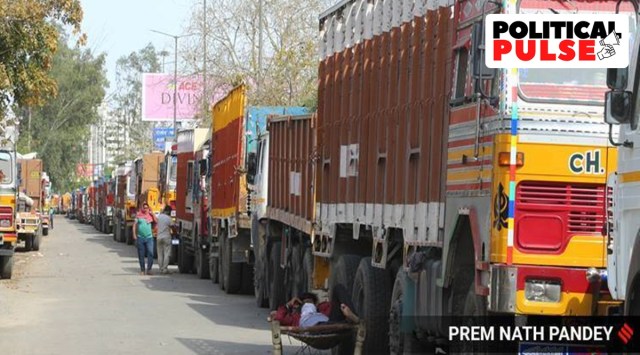Freight dispute over, Adani cement plants in Himachal Pradesh to reopen today
After 67 days, truckers and the Adani Group arrive at a consensus on new transportation rates, some other wrinkles to be ironed out in coming days
 The government said it was incurring a daily loss of Rs 2 crore in taxes due to the closure of the plants and it had lost about Rs 134 crore to date. (File)
The government said it was incurring a daily loss of Rs 2 crore in taxes due to the closure of the plants and it had lost about Rs 134 crore to date. (File) The 67-day standoff in Himachal Pradesh between two Adani Group-owned cement plants and truck unions ended on Monday with the two sides agreeing on new freight rates. The stalemate ended following a meeting chaired by Chief Minister Sukhwinder Singh Sukhu, with both sides deciding to resume operations on Tuesday.
The cement plants in Barmana (Bilaspur district) and Darlaghat (Solan district) have remained closed since December 15 as the truckers protested against Adani Cement lowering the transportation rates to Rs 6 per tonne per km (PTPK), while the market rate is Rs 10.58 PTPK in Dalarghat and Rs 11.41 PTPK in Barmana. Both the cement companies and the truck operators have now settled upon Rs 10.3 PTPK for single-axle trucks and Rs 9.3 PTPK for multi-axle vehicles.
In a statement, CM Sukhu said, “We have arrived at a consensus, thereby protecting the interests of both the truck-operator unions and the management, besides the welfare of all others who were being directly or indirectly hit by the stalemate.”
The CM also said, “Our government also constituted a committee headed by the Industries Minister to solve the logjam and I was well in touch with the committee, the company management, and the truck operators for immediately solving the issue.”
The CM also said that Principal Secretary (Industries) and other officers would chalk out a formula for matters related to the annual increase in freight rates. Instructions have also been given to the Deputy Commissioners of Solan and Bilaspur to solve the other problems of the truck operators, according to the statement.
The government said it was incurring a daily loss of Rs 2 crore in taxes due to the closure of the plants and it had lost about Rs 134 crore to date.
In a statement, the Adani Group said, “We are happy that all parties have come together and amicably resolved the ongoing discussions on the freight rates in the state of Himachal Pradesh. This outcome is positive for ACC and Ambuja Cements and all the stakeholders involved. In line with our commitments, we are pleased to share that ACC and Ambuja Cements will resume operations effective tomorrow at the Barmana and Darlaghat plants in Himachal Pradesh.”
It added, “The Barmana and Darlaghat units of ACC and Ambuja Cements are one of the largest industrial units in the state and play a vital role in providing employment and contributing to the economic viability of the state. The reopening of plants will help in the economic, social and overall development of the state.”
In September, the Adani Group completed the $6.5 billion acquisition of Ambuja Cements and ACC. Days after the Congress came to power, the plants closed down over the freight dispute.
A member of a truckers’ union, Chetan Mishra, said, “The rates have been offered to us by the Chief Minister. We know that there is a loss that is being borne by everyone. There will be more meetings with the cement company to discuss some minor issues. The functioning of the plant is imperative.”
Truck operators said they had been told by the government that the rates of diesel, which is an addition of 13 paisa, would be adjusted in the days to come.
Allegations and counter-allegations
As the dispute resulted in the closure of the plants, the truck operators cried foul over the Adani announcement coming right after the election results while the company accused the truck operators of controlling the market by oversupplying vehicles and maintaining a rate profitable only to the unions.
In a January 19 letter to the chairman of the Permanent Standing Committee of Himachal Pradesh and copied to the state’s Chief Secretary, Adani Cement CEO Ajay Kapur wrote, “It is a very alarming situation as unions are effectively controlling and making all transport-related operational decisions that belong in the domain of companies … Since the freight rate is controlled by the unions, they have artificially kept it at a very high level.”
In response, the truckers wrote to the chairman of the permanent standing committee on January 23, saying they are governed by the HP Cooperative Society Act, 1978, Rule 1971, and registered by-laws. The cement work was allocated and divided by the local administration, which nullifies any attempt to control the market, they claimed.
The Adani Group’s business in Himachal Pradesh is not limited to just cement production. The group’s AgroFresh division also procures apples from the hill state on a large scale during the season and supplies them in the domestic and international markets.
- 01
- 02
- 03
- 04
- 05




























